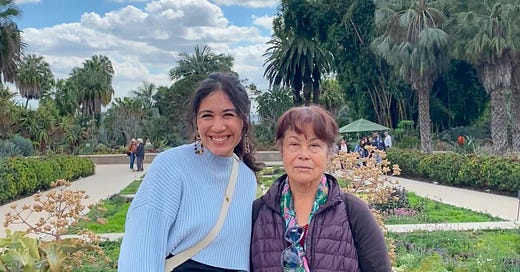I wake up to idyllic spring English sunshine and a chorus of chirping birds. Gone is my winter depressive spell and mornings now arrive full of optimism and excitement for the day ahead. I check my phone and see a missed FaceTime call from my grandma—she tried to call me at 5 in the morning.
My mind quickly flicks through the worst case scenarios before dismissing them. Since I've left the country, I've given up many of my normal responsibilities as eldest daughter and grandchild. I am no longer anyone's emergency contact or backup chauffeur. I am not the person to read through federal paperwork or translate official email notices. There are plenty of other family members, closer in distance and time zone, that have taken up the slack of my absence. I only receive notice of the family highlights via our massive group chat and the occasional FaceTime.
I assume my grandma has miscalculated the time change between LA and London, perhaps subtracted the hours in her mind instead of added. I send her a text to let her know she can call me when she's up—she never replies to texts, but I know she sees them because she has her read receipts turned on.
My phone rings before I've even finished reading through my other messages. My grandma is FaceTiming me from her pitch-dark bedroom. It's the middle of the night in Los Angeles and her hair is in rollers, but her voice is strong with the adrenaline of our connection, a dazzling feat of technological innovation that must feel worlds away from her childhood on the farm in Mexico. By comparison, my voice is still laced with the scratchy remnants of sleep.
(I almost roll my eyes at my own account of this moment, fearing that I may be turning her into a caricature of herself, but her history is so integral to my love for her that it feels remiss to omit).
We exchange hellos and my grandma confirms that she was conducting a test of the time difference. Somehow, she concludes that calling me in the middle of the night will be the best course of action going forward, since it is the morning for me. I try to dissuade her, explaining the hours of daytime overlap that we share, but I know she will probably stick to her witching hour plan anyways.
Nani has become sweeter since I left the country. Softer, too. Not that she was ever bitter or hard (at least, not with me). The best way I can explain it is like this:
Before, she was an affectionate greeter. She would hug me hello and greet me with food and hot coffee and iced tea and pan dulce and maybe even a gummy multi-vitamin she'd heard about on the news. Goodbyes involved efficient airport drop-offs and a packed lunch bag of sandwiches, apples, nuts, and some other sneaky treat.
Now, our visits are mostly digital. Her hellos are strung with excited emotion—verbose and welcoming and wistful. Her goodbyes are significantly more sentimental. We try to say goodbye at least three times before we actually hang up. There is always one more piece of news to be shared, one more blessing to be bestowed, one more I love you to be squeezed down the phone line.
After I moved to the UK, Nani sent me a letter in the mail. It was a card from CVS with a picture of a tractor and a cheesy accompanying caption, something along the lines of 'things are different now that you're not around.' I saw her carefully written out message wishing me well and immediately started crying.
While I've always felt especially connected to my grandma by being the eldest granddaughter (and the grandchild whose Spanish speaking skills are the most practiced), I didn't realize that my transcontinental move would unlock yet another layer of connection in our relationship: we are now both immigrants. Her move was fueled by a desire for opportunity; mine was fueled by a desire to be with my husband. But both of us have had to experience the culture shock of learning new holidays, new vocabulary, new social customs, new grocery stores... Most significantly, we both experience that ever-present yearning for the life and loved ones left behind; the mind-splitting reality of being here and there, of being home and not home.
She is one of the only people I know who can fully empathize with my experience, and yet I still forget to call her as often as I would like. The ever-irksome time difference catches me off guard. Weeknight dinner leads into dessert and drinks and a board game and an episode of TV. I call my mother instead, since she texted me today and thus is at the top of my contact list. I cry about my feelings alone and don’t call the person who would understand.
But we do call, sometimes. My tears reach their end and my mind remembers to plan for the timing. The updates are mostly positive and I tell her about Eurovision—it’s the kind of thing she would totally love. I wish I could show her how to find the livestream on the TV, but it’s the kind of tech-y tutorial that needs to be conducted in person. Perhaps we’ll do it some other year.
While this article is more personal, my quippy advice is quite straightforward: call the family you have. Even if the call is only five minutes and the updates are boring. It is so, so worth it.






So beautiful! What a great read!!